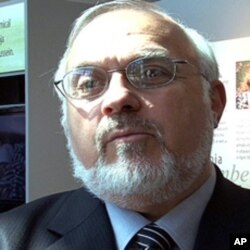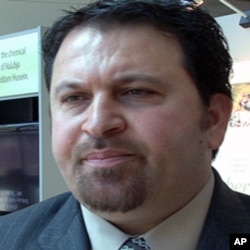An exhibit at the Museum of Tolerance in Los Angeles recalls one of worst atrocities of the late 20th century, the gassing of 5,000 Kurdish men, women and children in the town of Halabja by former Iraqi president Saddam Hussein. The exhibit opened this week, on the anniversary of the March, 1988 massacre.
The gas attack was orchestrated by Iraqi strongman Saddam Hussein and his cousin, Ali Hassan al Majid, known as Chemical Ali, and was aimed at the civilian Kurdish population of northern Iraq in the closing days of the Iran-Iraq war. Saddam planned to repopulate the area with Arab settlers from other parts of Iraq and he embarked on a policy of forced resettlement and mass murder.
Five thousand people died in the attack on Halabja on March 16, 1988. More than 100,000 Kurds would die in the following months as 4,000 villages were destroyed in what was known as the Anfal campaign.
The exhibit recalling the massacre was created for display at the United Nations in New York, where it was first shown. It was designed in conjunction with the Kurdistan Regional Government in Iraq, and can now be seen at the Museum of Tolerance in Los Angeles.
Rabbi Abraham Cooper is associate dean of the museum and the Simon Wiesenthal Center, a Jewish human rights organization. "What happened to the people in Halabja on March 16th, 22 years ago, should never have happened to begin with, should never happen again to anyone else, and we have learned from our own experience that silence is admittance. If you do not speak up, even in a case here where our community is not involved, then the world becomes complicit," he said.
He recalls that Simon Wiesenthal, the famous Nazi hunter after whom the Los Angeles center is named, warned of future genocides if the world stood by in silence in the face of atrocities. Rabbi Cooper says Wiesenthal, who died five years ago, spoke out against the killing of Kurds and other groups.
"You have a special moral obligation to speak out and do what you can when others, in this case, the people of Halabja and other Kurdish communities, were gassed by Saddam Hussein and his regime so many years later," he said.
Today, Kurdistan is an autonomous region within Iraq. The U.S. cultural attaché for the Kurdistan regional government, Najat Abdullah, says that Kurdistan has recovered. "And as we expect, day by day, Kurdistan grows and Kurdistan becomes more democratic, Kurdistan becomes more the safest place in Iraq," he said.
But he says that this atrocity needs to be remembered.
Saddam Hussein was sentenced to death by an Iraqi court and hanged in December, 2006. Ali Hassan al Majid was executed this January.





